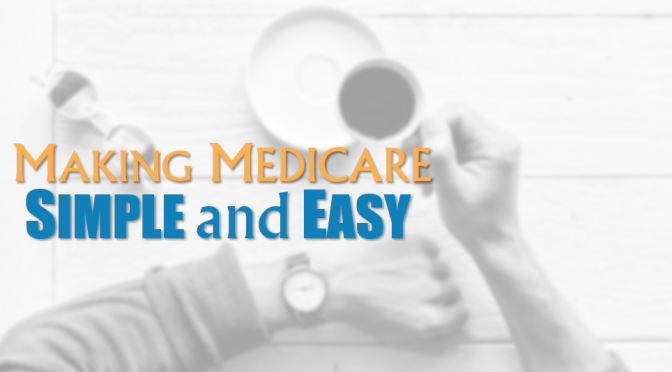 There are many parts to Medicare, and with that comes confusion and a good chance at missing something. It is essential for everyone approaching age 65 to get informed on Medicare and sign up for the right plan at the right time. Neglecting the chance to act at making the best Medicare decisions could cost you. Here’s how to avoid these seven common mistakes so you can get the right coverage without overpaying on premiums and deductibles, experiencing gaps in coverage, or getting hit with high penalty fees.
There are many parts to Medicare, and with that comes confusion and a good chance at missing something. It is essential for everyone approaching age 65 to get informed on Medicare and sign up for the right plan at the right time. Neglecting the chance to act at making the best Medicare decisions could cost you. Here’s how to avoid these seven common mistakes so you can get the right coverage without overpaying on premiums and deductibles, experiencing gaps in coverage, or getting hit with high penalty fees.
- Deciding without fully understanding each Medicare plan.
Medicare has many plan options making it very confusing and hard to decide which plan is best. It is essential for new enrollees to do their homework on Medicare before their enrollment period, so they know precisely the action they need to take. It’s necessary to become familiar with the differences between Original Medicare with a Medicare Supplement or “Medigap” plan, and Medicare Advantage plans, also known as “Part C.” Not knowing what your final choice has to offer could leave you with a plan that doesn’t fully cover your specific healthcare needs.
- Going out of your plan’s network.
It is essential to realize when you sign up for Medicare, not every health provider will accept your specific plan and that this could change every year. Most places accept original Medicare and therefore, any Medicare supplement plan, but if you have a Medicare Advantage plan, you might not be covered if the provider is out of network. Always make sure to check if the doctor or hospital you are going to is in your network or it could mean an expensive bill. One more thing to be wary of here is that doctors and hospitals can stop taking Medicare Advantage plans ANY TIME, even though you have to wait until fall to change your plan. We see doctors jumping out mid-year, and that puts people at a crossroads: either I see my current doctor and pay for visits/procedures out of pocket, or, I find a new doctor who is in my network (for now). One more thing – if you think that your plan covers emergencies out-of-network, we want to kindly remind you that the insurance companies dictate what is considered an “emergency.” What you find emergency room-worthy actually isn’t up to you.
- Missing your enrollment periods.
There are enrollment periods that vary from person to person, depending on when an individual turns 65 or when they decide to leave their current job that provides them with healthcare benefits. When turning 65, eligibility to sign up for Medicare begins three months before your birthday month and continues for three months after. If you turn 65 and still have healthcare coverage through your job, you may want to delay your Part B enrollment until you seek full benefits from Medicare. This depends on the situation, size of the company, and the cost comparison, so you definitely want to discuss this with an expert to be sure you make the right moves. The Annual Enrollment Period (AEP) is the same for everyone, every year, which begins October 15th and goes until December 7th. This is the only time frame for current Medicare beneficiaries to change Part D prescription plans or Medicare Advantage plans. You can change a Medicare Supplement plan any time you want, however. It’s important to become familiar with these time frames, so you aren’t left without coverage at any time or hit with late-enrollment fees or penalties.
- Ignoring your Annual Notice of Change (ANOC).
The Annual Notice of Change (ANOC) is sent out to all Medicare beneficiaries before the Annual Enrollment Period stating any changes to plans and costs that will take place the following January. If you don’t read your NAOC, you might not know if your plan details or costs have changed, and it could leave you without coverage in certain areas and/or more expensive bills. You might learn it is in your best interest to keep the plan you have, but ignoring this critical update from your insurance company could result in getting stuck in a plan that costs way too much or doesn’t take care of your needs.
- Improperly signing up for Medicare Part B.
Once you turn 65, you are automatically enrolled in Medicare Part A (which covers your facility costs at the hospital) because you worked more than 40 quarters (10 years) and it does NOT come with a premium. Medicare Part B, however, not only comes with a premium (income-based, starting at $135.50 per month for 2019) but also comes with huge penalties and expenses if you enroll or delay enrollment improperly. If you are still working and you plan to continue working after your 65th birthday, you will need to find out the answers to a few critical questions. First off, is your company larger than 20 employees? If so, they MUST offer you health coverage while you are still employed. However, this does not mean you have to or should take this. It’s best at that point to compare your predicted costs with your employer plan versus your options under Medicare. About 50% of the time, it makes sense to leave your employer plan for Medicare. Definitely something you want to discuss with an expert. Okay, here is another common situation, let’s say you decide not to take Medicare Part B, and your employer is found to be less than 20 employees, otherwise known as not-credible coverage. If your plan is found to be not-credible coverage then when you go to take Medicare Part B, Medicare charges you a 10% penalty of the premium (about $13.50 per month at the lowest income bracket) for the rest of your life. That penalty can really add up. Lastly, let’s say that you take your Medicare Part B while you are still working and your employer has over 20 employees, so you stay on this insurance, too. The problem people run into with this is that when you take your Medicare Part B, not only are you paying a premium for coverage you aren’t using, but you run the risk of lapsing your Open Enrollment window. This is the time that lasts for six months (three months before and three months after your 65th birthday) in which you can choose any Medicare Supplement plan you want, with no medical questions asked. When you lapse this window while it’s sitting as your secondary insurance to employer coverage, when you retire, you will have to be reasonably healthy to get supplemental coverage.
- Missing your opportunity to switch plans.
There are many reasons a beneficiary might want to change Medicare plans, but it is easy to miss the chance to do so when it comes to prescription and Medicare Advantage plans. Just like enrollment, there are only specific periods where switching is possible. You can make changes to your prescription and Medicare Advantage plans during AEP. With Medicare Advantage plans, you have a 1-year trial period from the first date active, which allows you to switch to Original Medicare anytime within that timeframe if necessary. There are other unique opportunities to change, including life events like moving to a new area where your current plan doesn’t exist. The most common reason to switch plans is to save money, so make sure you understand your enrollment windows.
- Signing up for the same plan as your spouse.
When you get health insurance through an employer, often you can choose a plan that covers you and your spouse. With Medicare, you each need an individual plan, and it isn’t always the best option to go with the same insurance company, let alone plan. As you age, the chances of having different healthcare needs than your spouse become higher, so it is significant for beneficiaries to pick a plan that is specific to you and your personal needs. Often, healthy couples can and should take the same plan, because some insurance companies offer household discounts. Comparing companies and rates is the best way to decide what’s most cost-effective for you and your spouse.
Medicare is confusing, and finding a helpful resource isn’t always easy. Here at Senior Health Medicare, we aim to be that helping hand that you can rely on so you can avoid making these mistakes and navigate Medicare with ease. If you have any further questions about this blog or anything Medicare-related, please feel free to comment on this post or contact one of our helpful experts by phone.






